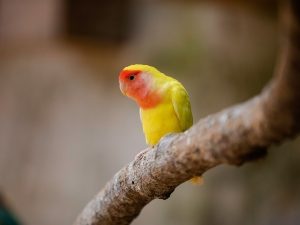
Flaking happens to humans because of direct damage to the skin, but your budgie’s beak is not made up of skin, however, it does peel and flake
This article is a look into why your budgie has a flaky beak
Table of Contents
Budgie flakey beak:
Any change in how your budgie looks and acts should be concerning to you, these changes may be good for the bird or may indicate that there is something wrong with the bird.
There are a variety of things that may be going wrong with your budgie if the birds beak starts to flake, this is what may be going on with your bird:
Peeling:
All birds have beaks that are made out of keratin, keratin is the same material that makes up our nails, and just like our nails keratin keeps growing.
When a budgie’s beak grows the old keratin is shed off and new keratin replaces it. The old keratin may look like flaking on the bird’s beak
What to do:
Budgies in the wild usually have materials that they use to scratch their beaks against and this keeps their beaks smooth and removes the flakiness off of the bird’s beak.
If you don’t have any rough surfaces for your budgie to scratch its beak against then you’d have to install these in the bird’s environment to give the bird the opportunity to scratch the flaking keratin off. The birds will use these materials as they see fit.
You don’t have to personally do anything else to try to get the peeling off, the keratin will come off when it is good and ready.
If you find that your bird’s beak is still fakely long after you’ve offered the rough materials then taking the bird to an avian vet is recommended.
A simple scratch:
If your bird is curious then it likely explores a lot and uses its beak to explore, however, this exploration can lead your bird to some danger or cause it to injure itself.
If your bird was exploring it may have scratched its beak against something hard and sharp. The keratin that was scraped off will have to grow back and flaking at the site might develop as new keratin grows and pushes the old keratin away.
What to do:
As long as the bird’s beak isn’t bleeding then you can let the bird be, the bird will recover from the scratch in its own time. Once the beak has recovered it will be smooth, won’t flake, and will be good as new.
Allergy:
Another reason why your bird’s beak may be flaking may be because the bird is allergic to something in his cage. While allergic reactions in birds aren’t talked about too much they do happen.
Some of the signs of an allergic reaction in birds can include sneezing and wheezing but other examples include flaking, including flaking at the birds beak
If you’ve added something new to your bird’s cage then this may be it
What to do:
Buying new perches for your bird is recommended, buy perches made up of different materials and throw away the perches that your bird is currently using, replace the perches that your bids are using with different perches.
It is also recommended that you wash everything in the bird’s cage including the bird’s swings, cage bars, and bowls. Create a mix of hot water and dial soap and use this to wash your bird’s items.
Also, go ahead and wash the bird’s beak and feet once you’ve washed everything in the bird’s cage. Avoid dunking the bird’s head in water or else the bird may drown
Mites:
Mites can also be the reason behind your budgie’s beak suddenly flaking. Birds can get scaley leg mites and they can get scaley face mites too
If the mites find themselves onto your bird’s face then these eight-legged insects can dig into the keratin on your bird’s beak and cause the beak to start flaking.
Not only can these mites burrow into to your bird’s face and beak, they can also burrow into the bird’s eyes, so treatment is a must.
What to do:
The treatment for this condition in your birds is ivermectin, this is an antiparasitic veterinary medicine that will get rid of your bird’s parasite problem.
It is important to take your bird to the vet to be checked for mites and get a professional to confirm that your bird has mites.
Budgies have very fragile respiratory systems, and although the mite medications are effective insecticides to give the birds, these medications are still quite dangerous to the bird if the bird isn’t actually infected with mites.
This is why it is important to consult with a vet to get an accurate diagnosis.
If the vet does recommend that you give this medication to your bird then the medication will usually be given for 7 – 10 days.
You can keep these mites from infecting your bird in the future by giving your bird vitamin A supplements, this vitamin will help the birds build immunity against this parasite.
If you enjoyed this article then you may also be interested in other budgie related articles. Here are some articles that you may be interested in: Budgie bleeding under wing, My Budgie’s Beak Turning Blue, Why Does My Budgie Hang Its Head, Budgie Bruised Beak, Bare Budgie Bottom

